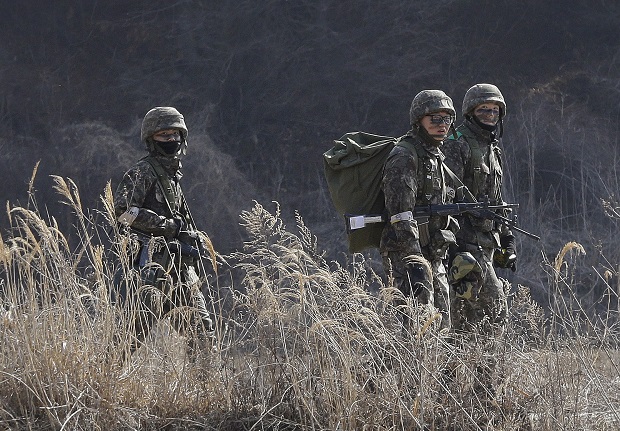S. Korea on top alert as North attack deadline looms

South Korean army soldiers move during their military exercise near the demilitarized zone between the two Koreas in Paju, South Korea, Monday, March 2, 2015. North Korea on Monday fired two short-range ballistic missiles into the sea and warned of “merciless strikes” against its enemies as allies Seoul and Washington launched annual military drills Pyongyang claims are preparation for a northward invasion.(AP Photo
SEOUL, South Korea—South Korean troops stood at maximum alert Saturday with North Korea threatening to go to war unless Seoul meets a looming deadline to halt loudspeaker propaganda broadcasts across the border.
The North Korean People’s Army (KPA) said late Friday that its frontline troops had moved into a “fully armed, wartime state” in line with the wishes of leader Kim Jong-Un and ahead of the Saturday 5:00 p.m. (0830 GMT) deadline.
The international community has long experience of North Korea’s particularly aggressive brand of diplomatic brinkmanship and, while there is concern over the potential for escalation, many see the situation as another exercise in attention-seeking by Pyongyang.
“Given their past negotiating style and tactics, the likelihood that they will follow through with their threat of a military action is low,” said James Kim, a research fellow at the Asan Institute think-tank in Seoul.
At the same time, Kim acknowledged that second-guessing Pyongyang’s game plan was always risky, and the possibility of a North Korean strike of some sort could not be ruled out.
“If so, South Korea must have a firm, strong, and timely response to signal its resolve that it will not be intimidated. Anything less would be an invitation for further provocation,” he said.
Public calm
For the moment, there has been little sense of panic among ordinary South Koreans who have become largely inured over the years to the North’s regular—and regularly unrealized—threats of imminent war.
Technically, the two Koreas have been at war for the past 65 years, as the 1950 to 1953 Korean conflict ended with a ceasefire that was never ratified by a formal peace treaty.
The last direct attack on the South was in November 2010 when North Korea shelled the South Korean border island of Yeonpyeong, killing two civilians and two soldiers.
Kim’s order on Friday to move to a war footing came after an exchange of artillery fire on Thursday that claimed no casualties but triggered a dangerous spike in cross-border tensions.
Tensions were already running high over some mine blasts earlier this month that maimed two South Korean border soldiers, and the launch last Monday of an annual South Korea-US military exercise that infuriated Pyongyang.
Despite Pyongyang’s subsequent denials, South Korea said the North was behind the blasts and responded by resuming propaganda broadcasts across the border—a practice both Koreas had ended by mutual consent in 2004.
The move outraged the North, which eventually issued its 48-hour ultimatum for the South to turn off the loudspeakers by Saturday afternoon, or face military action.
‘Brink of war’
South Korea says it has no intention of removing the loudspeakers, and on Friday President Park Geun-Hye appeared on television, wearing army fatigues and telling top military commanders that further North Korean provocations “will not be tolerated.”
The North Korean foreign ministry warned in a statement early Saturday that “the situation which has reached the brink of war is now hardly controllable.”
The situation is being closely watched, with UN chief Ban Ki-moon calling for restraint from both sides and the United States urging Pyongyang to avoid further escalation.
There are nearly 30,000 US troops permanently stationed in South Korea, and the Pentagon has reiterated its commitment to the defense of its ally.
A call for calm and restraint also came from China, the North’s main diplomatic protector and economic supporter.
Ties between Beijing and Pyongyang have become strained, and China will be keen to avoid any regional flare-up as it seeks to attract world leaders to Beijing next month for a three-day celebration of Japan’s defeat in World War II.














